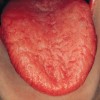Treatments for dry mouth
 Xerostomia (the feeling of dry mouth) is common especially in older adults. Causes include medications, autoimmune disease (Sjögren’s Syndrome), radiotherapy or chemotherapy for cancer, hormone disorders, and infections.
Xerostomia (the feeling of dry mouth) is common especially in older adults. Causes include medications, autoimmune disease (Sjögren’s Syndrome), radiotherapy or chemotherapy for cancer, hormone disorders, and infections.
This Cochrane review evaluated the evidence for topical treatments to reduce symptoms.
First, the details.
- 36 studies involving 1597 participants were included.
- 2 compared saliva stimulants to placebo.
- 9 compared saliva substitutes to placebo
- 5 compared saliva stimulants directly with saliva substitutes
- 18 compared 2 or more saliva substitutes
- 2 studies directly compared 2 or more saliva stimulants
- Only one study was at low risk of bias, while 17 were at high risk of bias.
And, the results.
- Treatments applied directly to the inside of the mouth: sprays, lozenges, mouth rinses, gels, oils, chewing gum or toothpastes
- No strong evidence that any were effective for relieving the sensation of dry mouth
- Oxygenated glycerol triester (OGT) saliva substitute spray
- Showed evidence of effectiveness vs an electrolyte spray
- Average difference of 2 points on a 10-point scale for mouth dryness
- Integrated mouth care systems (toothpaste + gel + mouthwash) and oral reservoir devices
- Promising results but insufficient evidence to recommend their use
- Chewing gum
- Associated with increased saliva production in the majority of those with residual capacity
- Gum
- No evidence it is more or less effective than saliva substitutes
The bottom line?
The authors concluded, “In many sufferers dry mouth cannot be cured, but effective ways for people to manage dry mouth symptoms are available.”
They also tell us that acidic products and those containing sugar should be avoided. It makes no sense to increase the risk of dental cavities.
1/30/12 20:59 JR